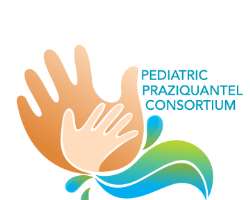Pediatric Praziquantel Consortium takes next step towards access with continued support from the GHIT Fund

A fourth consecutive research grant from the Global Health Innovative Technology (GHIT) Fund will allow the Consortium to pursue certification by the European Medicines Agency of its novel child-friendly praziquantel formulation – a key step in providing global access to the new treatment.
9 May 2019, Utrecht, The Netherlands. A supplementary US$ 4.1 million investment from the GHIT Fund has further reinforced the Pediatric Praziquantel Consortium’s efforts to develop, register and provide access to a novel orally dispersible praziquantel tablet formulation for children. It will help the Consortium in its efforts of bringing closer the treatment of preschool-age children suffering from schistosomiasis.
“I am grateful and excited that the GHIT Fund has reaffirmed its confidence in the Consortium and in its goal to fill the current treatment gap that exists for preschool-age children suffering from schistosomiasis,” said Dr Jutta Reinhard-Rupp, Chair of the Consortium Board and Head of the Global Health Institute of Merck. “This is one of the most prevalent parasitic diseases worldwide, but we lack a suitable child-friendly formulation of praziquantel, which is regarded as the ‘standard of care’ treatment for schistosomiasis. It means that around 28 million infected preschool-age children are currently left untreated.”
Including this fourth grant, the GHIT Fund has now invested almost US$ 16 million in the pediatric praziquantel development program. Catherine Ohura, CEO of the GHIT Fund, said: “Since 2013, the pediatric formulation, originally developed by Astellas Pharma Inc. (Tokyo, Japan), has progressed from the preclinical to the current pivotal clinical Phase III stage. The financial and program level support from Merck in-kind contributions by the Consortium’s partners, and the funding from the GHIT Fund and other co-funders including the Bill and Melinda Gates Foundation and the European and Developing Countries Clinical Trials Partnership (EDCTP), all highlight the Pediatric Praziquantel Consortium as a prime example of partnerships addressing the medical needs of neglected populations in low- and middle-income countries.”
The new GHIT grant will be used to prepare the core regulatory dossier for submission to the European Medicines Agency, and to complete the validation and scale-up of the Consortium’s cost-effective drug substance manufacturing process. It will also allow the Consortium to conduct an additional supportive Phase III clinical trial. Finally, the Consortium will use the grant to continue its investigation into novel financial procurement models for sustainable access and delivery of the new medicine to preschool-age children in sub-Saharan Africa, with an emphasis on ensuring future affordability, availability and adoption of the new medicine.
About the Pediatric Praziquantel Consortium
The Pediatric Praziquantel Consortium is an international not-for-profit partnership that aims to reduce the global disease burden of schistosomiasis by addressing the medical need of infected preschool-age children. Its mission is to develop, register and provide access to a suitable pediatric praziquantel formulation for treating schistosomiasis in this age group. The pediatric formulation under investigation has been designed to be smaller, exhibit an improved palatability and be orally dispersible compared with the current commercial formulation. For more information, visit the Consortium website: www.pediatricpraziquantelconsortium.org
Consortium Partners
- Merck KGaA (Darmstadt, Germany), leads the program and provides expertise and support from different areas: preclinical, clinical, drug substance/drug product development and manufacturing, regulatory and access. It is responsible for the clinical development program and is sponsor of the clinical trials.
- Astellas Pharma Inc. (Tokyo, Japan) has developed the new pediatric PZQ formulations, and provides expert advice on clinical development in children, and pharmacokinetic modeling.
- Swiss Tropical and Public Health Institute (Switzerland) is a not-for-profit Institute internationally renowned for its research, services, teaching and training in global health. It contributes extensive experience in helminths biological and pharmacological research; epidemiology; and clinical research in endemic regions.
- Lygature (The Netherlands), a not-for-profit foundation, acts as the independent coordinator of the Consortium, providing governance in terms of progress, finance and collaboration. Since 2006, Lygature has supported close to a hundred public-private partnerships in the field of life sciences & health, including poverty-related diseases.
- Farmanguinhos (Brazil), the federal governmental pharmaceutical laboratory of the Fiocruz Foundation in Brazil, brings unique expertise to producing and distributing the new pediatric formulation product in endemic countries.
- The Schistosomiasis Control Initiative (United Kingdom), at Imperial College London, is a non-profit initiative that supports governments in sub-Saharan African countries to develop sustainable programs against parasitic worm infections. It will facilitate preparation and implementation of the Access and Delivery plan.
- Kenya Medical Research Institute (Kenya) provides expertise on local disease epidemiology, clinical trials and clinical care and will be responsible for the conduct of the clinical phase III trial in Kenya according to Good Clinical Practice and national and local regulatory and ethics standards.
- Université Félix Houphouët-Boigny (Côte d’Ivoire) was involved in the clinical phase II trial of the pediatric praziquantel formulation. It provides expertise on local disease epidemiology, clinical trials and clinical care and will be responsible for the clinical phase III trial in Côte d'Ivoire according to Good Clinical Practice and national and local regulatory and ethics standards.
Acknowledgement of support
The Consortium is financially supported by Merck in-kind contributions from the Consortium’s partners; and grants from the Bill and Melinda Gates Foundation (2012), from the Global Health Innovative Technology Fund (2013, 2014, 2016 and 2019), and the European and Developing Countries Clinical Trials Partnership (2018).
